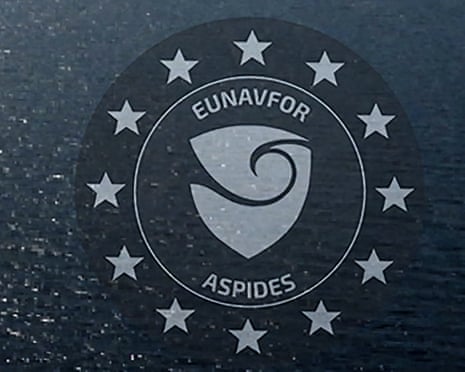Berlin summons Chinese ambassador over military use of laser targeting German aircraft – Europe live | Europe

Germany summons Chinese ambassador over use of laser targeting German aircraft

Deborah Cole
Meanwhile, the German foreign ministry has summoned the Chinese ambassador in Berlin, reporting that the Chinese military used a laser to target a German aircraft taking part in the EU operation Aspides, which helps protect shipping in the Red Sea.

“The endangerment of German personnel and disruption of the operation are completely unacceptable,” the ministry said on X, announcing the summons.
The foreign ministry, the Chinese embassy and the Aspides mission did not immediately respond to requests for comment.
European officials have repeatedly expressed concern about Chinese influence on critical infrastructure including key shipping routes.
The EU established Aspides, from Ancient Greek meaning “shields”, as a defensive maritime security operation to safeguard navigation during the Red Sea crisis.
Since Israel’s war in Gaza against the Palestinian militant group Hamas began in October 2023, Iran-backed Houthi militants have been attacking Israel and vessels in the Red Sea in what they say are acts of solidarity with the Palestinians.
The German military has been participating in the Aspides operation since February 2024. Its parliamentary mandate sets a maximum deployment of 700 military personnel.
Key events
In a strong paragraph outlining her intellectual vision for Europe, Denmark’s Frederiksen says:
“Europe is first and foremost an idea.
It is the way we think.
Our fundamental values, freedom, democracy, the rule of law, our firm belief in progress, science and common sense, that we always seek to move make tomorrow better than today, our social model, that we are free to think as we want, believe what we want, and speak as we see fit.
These are the fundamental ideas on which our continent is built, and they run in the blood of all Europeans.
Europe is cooperation, discussions and difficult compromises.
But above all, Europe is a magnificent, rich and diverse continent that has managed to rise again and again and in a time where fundamental values are being questioned, the response from our side needs to be firm and to be clear, we must in every way possible, be willing to protect our democracies, our freedom and rights and our prosperity.”
‘Europe is facing greatest challenges since 1940s,’ Denmark’s Frederiksen

Jakub Krupa
Danish prime minister Mette Frederiksen is now giving a major speech in the European parliament, outlining Denmark’s priorities for the EU as it takes the rotating presidency of the Council of the European Union.
Opening, she warns that “Europe is facing the greatest challenges since the 1940s,” as she lists a growing lists of urgent issues, with Russia’s aggression on Ukraine, migration, the Middle East, trade, and terrorism.
She says:
“The threats may be many, and they are indeed serious, but I have trust in Europe.
Trust that we can move our continent forward, build a more secure Europe, a greener and more competitive Europe, a new Europe of tomorrow with possibilities and welfare for our citizens, but only if we remember what we are capable of, what our societies are built upon, and who we really are as Europeans.”
Germany summons Chinese ambassador over use of laser targeting German aircraft

Deborah Cole
Meanwhile, the German foreign ministry has summoned the Chinese ambassador in Berlin, reporting that the Chinese military used a laser to target a German aircraft taking part in the EU operation Aspides, which helps protect shipping in the Red Sea.
“The endangerment of German personnel and disruption of the operation are completely unacceptable,” the ministry said on X, announcing the summons.
The foreign ministry, the Chinese embassy and the Aspides mission did not immediately respond to requests for comment.
European officials have repeatedly expressed concern about Chinese influence on critical infrastructure including key shipping routes.
The EU established Aspides, from Ancient Greek meaning “shields”, as a defensive maritime security operation to safeguard navigation during the Red Sea crisis.
Since Israel’s war in Gaza against the Palestinian militant group Hamas began in October 2023, Iran-backed Houthi militants have been attacking Israel and vessels in the Red Sea in what they say are acts of solidarity with the Palestinians.
The German military has been participating in the Aspides operation since February 2024. Its parliamentary mandate sets a maximum deployment of 700 military personnel.
Trial begins after attempted murder of Slovak prime minister
Over in Slovakia, a 72-year-old man who shot and wounded Slovak prime minister, Robert Fico last year has gone on trial in Banská Bystrica.
During the attack in May last year, Fico, a divisive figure in Slovak politics, was shot in the abdomen and had to undergo two major surgeries in the first days after the attack. He has since recovered.
The attacker, Juraj Cintula, was arrested immediately after the incident and charged with attempted murder, later converted into terror charges. If convicted, he faces life imprisonment, Reuters noted.
“Long live democracy, long live free culture,” he shouted as he arrived at the court. According to reports in Slovak media, he did not enter a plea and refused to testify in court.
Fico is not present in court.
The case continues.
EU still hopes to conclude deal with US on tariffs

Lisa O’Carroll
The EU still hopes to conclude an agreement in principle this week with Donald Trump over tariffs, after it was granted an extension of three weeks for talks.
Ireland’s deputy prime minister Simon Harris revealed the bloc had been given until 1 August to conclude talks or face tariffs on imports of up to 50%.
In exchange for an acceptance of a 10% baseline tariff, the EU is looking for a series of concessions.
This includes a reduced tariff quota for car imports and steel, currently attracting import duties of 27.5% and 50% respectively.
This addresses Germany’s critical demand for concessions for its beleaguered car industry. The compromise would centre on manufacturers with plants in the US including major German brands Mercedes-Benz, BMW and Volkswagen.
And the EU is looking for concessions on medical devices and wine and spirits, which currently attract a 10% tariff
The EU also wants the tariff relief to kick in immediately after an agreement is signed, and not have to wait weeks, as the UK did, for formal text to be registered by the White House.
Uncertainty remains over Trump’s threatened tariffs on pharma, Harris said. “This is obviously an area of significant concern to Ireland,” he said.
In a statement issued last night he added:
“My understanding is that we can now expect an extension of the current status quo until 1 August to give further time for the EU and the US to reach an agreement in principle on a mutually beneficial agreement that works for both sides.
However, it remains the position of the EU and the Irish government that we would like to conclude discussions on a trade agreement before 1 August. I remain cautiously optimistic about reaching agreement in principle on a Framework Agreement.
I want to be clear that while it is likely there will be some form of tariffs going forward, their imposition even at a lower rate is bad for consumers, jobs, economic growth and investment.”
Separately, The Irish Times’s view of the three-week extension for EU talks with the US is that it offers little comfort to EU capitals.
It notes that Ireland is terrified of tariffs on pharmaceuticals, one of its biggest multinational sectors and employers, but it also points out that if the result of talks is a 10% baseline tariff, then Trump has won.
Its morning newsletter opined:
“A three-week pause on the deadline to a 90-day pause on tariff hikes – will not be met with sighs of relief in Dublin, or any other European capital.
The base expectation has been for some time that tariffs are part of the picture when dealing with Trump’s second administration, something which Tánaiste and Minister for Trade Simon Harris has consistently articulated.
But rather than dealing with the consequences of a punishing new trade regime, which refuses to crystallise, Ireland and the rest of the world is stuck in a kind of purgatory – counting the cost of uncertainty while trying to navigate the ambiguities of global trade under Trump.”

Jakub Krupa
Now, let’s get an update on the EU-US trade talks, from Lisa O’Carroll.
EU’s von der Leyen derides right-wing conspiracies as she fights against motion of censure against her commission

Jennifer Rankin
As we wait for more reactions from Ukraine, let’s start with a brief catch up on last night’s European parliament debate on Ursula von der Leyen and her leadership of the European Commission.
Nearly one year ago von der Leyen was returned as European Commission president by the European parliament with a bigger majority than the first time around in 2019. The same forces that propelled her back to office with a comfortable level of support in 2024 are now keeping her safely in post.
Speaking to MEPs on Monday, von der Leyen dismissed as “debunked conspiracy theories” the central claims of a motion of censure designed to unseat her, framing the political move from a right-wing nationalist MEP as part of “an age of struggle between democracy and illiberalism”.
The European parliament will vote on Thursday on a motion tabled by Romanian nationalist anti-vaxxer MEP Gheorghe Piperea, ostensibly over von der Leyen’s refusal to release text messages linked to the negotiation of vaccine contracts during the pandemic. In theory, the vote could trigger the downfall of von der Leyen and her commissioners.
But even its author does not expect it to get the required majority.
Addressing MEPS in Strasbourg on Monday, von der Leyen derided Piperea’s world of conspiracies and alleged sinister plots by “what he calls Brussels”, going on to point to wider threats to democracy from extremist parties,
“There is no proof that they have any answers, but there is ample proof that many are supported by our enemies and by their puppet masters in Russia or elsewhere.”
Unsurprisingly she was strongly supported by her own European People’s Party group. Equally expected, were the unenthusiastic declarations of support from the socialists, centrists and greens, who voted for her in 2019, and will vote against the upcoming motion of censure. They have grievances, but none want to hand a gift to the anti-EU far-right, by bringing down the commission at such a turbulent moment for international politics.
Iratxe García Pérez, leader of the Socialist group, criticised the EPP over the occasions it had voted with the far right, as well as the centre-right group’s stance on the EU’s 2040 climate targets and opposition to an EU ethics body. She accused von der Leyen of looking the other way on these issues.
Valérie Heyer, a French member of the centrist Renew group, chided von der Leyen for the same reasons, concluding: “Don’t take anything for granted. Please put your own political house in order.”
While the far-right – Hungarian prime minister Viktor Orbán’s Patriots for Europe and the more extreme Europe of Sovereign Nations – will vote for the motion, the other right-wing group, the European Conservatives and Reformists, is split.
Piperea, an ECR member, was responsible for the motion, but the group is dominated by the party of the Italian prime minister Giorgia Meloni, who has no wish to bring down the more right-leaning commission – which includes a vice presidency post for her ally, Raffaele Fitto. They will have a free vote, where two-thirds of their 79 MEPs are expected to vote against the motion.
For her part, von der Leyen offered a modest olive branch to her supporters, saying she was always ready to work for compromise. Listing EU-US trade talks, Ukraine, China, she dropped a not very subtle hint at the stakes: “Europe must show strength… This strength only comes through unity.”
We are yet to hear Ukraine president Volodymyr Zelenskyy’s reaction to Trump’s announcement overnight, but his most senior aide Andriy Yermak responded to the Pentagon statement with a not-so-cryptic post on social media showing the flags of Ukraine and the US with a handshake emoji.
UK imposes sanctions on head, deputy of Russia’s principal chemical weapons unit

Dan Sabbagh
Defence and security editor
The UK has sanctioned the head and a deputy of Russia’s principal chemical weapons unit over the illegal use of CS teargas in Ukraine ahed of a meeting of the executive council of the Organisation of Prohibition of Chemical Weapons.
Aleksey Rtishchev, the chief of Russia’s Radiological, Chemical and Biological Defence unit (known as RKhBZ) and Andrei Marchenko, a deputy will now both be subject to sanctions following OPCW reports that gas was used on the battlefield.
Though CS gas is used as a crowd control agent in several countries, its use in war is prohibited by the chemical weapons convention. Last November the OPCW confirmed there was evidence of the use of teargas on the frontline, at Ilinka, near the town of Nikopol.
The UK has already sanctioned the RKHBZ unit as well as its former chief Igor Kirillov, though he was assassinated by Ukraine last December by a bomb hidden in a scooter, after Kyiv accused Russia of deploying chemical weapons hundreds of times.
Britain also sanctioned The Joint Stock Company Federal Production Centre Scientific Research Institute of Applied Chemistry for transferring gas grenades to the Russian military.
Stephen Doughty, the sanctions minister, said “Barbaric chemical weapons are supposed to be consigned to history, and yet Russia continues to deploy them on the battlefield in Ukraine.”
Morning opening: US agrees to send ‘defensive’ military aid to Ukraine

Jakub Krupa
The big news overnight is that US president Donald Trump said the US will send additional weapons to Ukraine to help it defend itself against ongoing attacks by Russia.
Talking to journalists at the White House, Trump said “they are getting hit very, very hard,” adding he was “not happy” with Russian president Vladimir Putin.
They have to be able to defend themselves.
A Pentagon statement shortly afterwards confirmed that
“at president Trump’s direction, the Department of Defense is sending additional defensive weapons to Ukraine to ensure the Ukrainians can defend themselves while we work to secure a lasting peace and ensure the killing stops.”
The move comes a week after a confusing halt in military deliveries for Ukraine despite continuing attacks by Russia, which prompted Kyiv and several European capitals to urge the US to rethink its position.
The issue was also discussed during last week’s direct call between Trump and Ukrainian president Volodymyr Zelenskyy.
Despite the announcement overnight, Russia continued attacks on Ukraine, with explosions reported in the southern Ukrainian city of Mykolaiv, among others.
Elsewhere, we will be looking at the latest in the EU-US trade talks, the beginning of French president Emmanuel Macron’s state visit to Britain, key votes in the European parliament, and the beginning of the trial of a man who shot and wounded Slovak prime minister Robert Fico last year.
It’s Tuesday, 8 July 2025, it’s Jakub Krupa here, and this is Europe Live.
Good morning.




